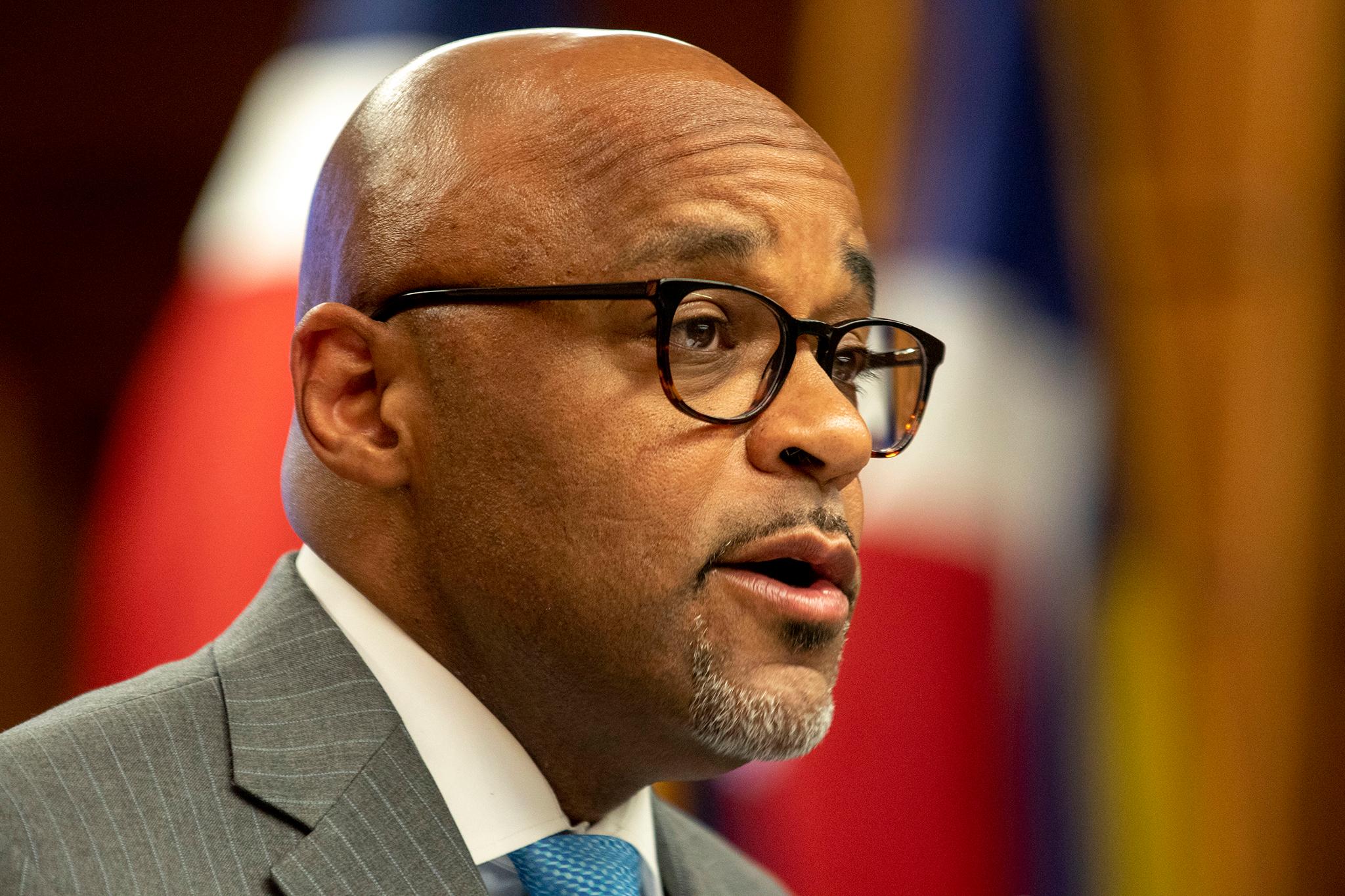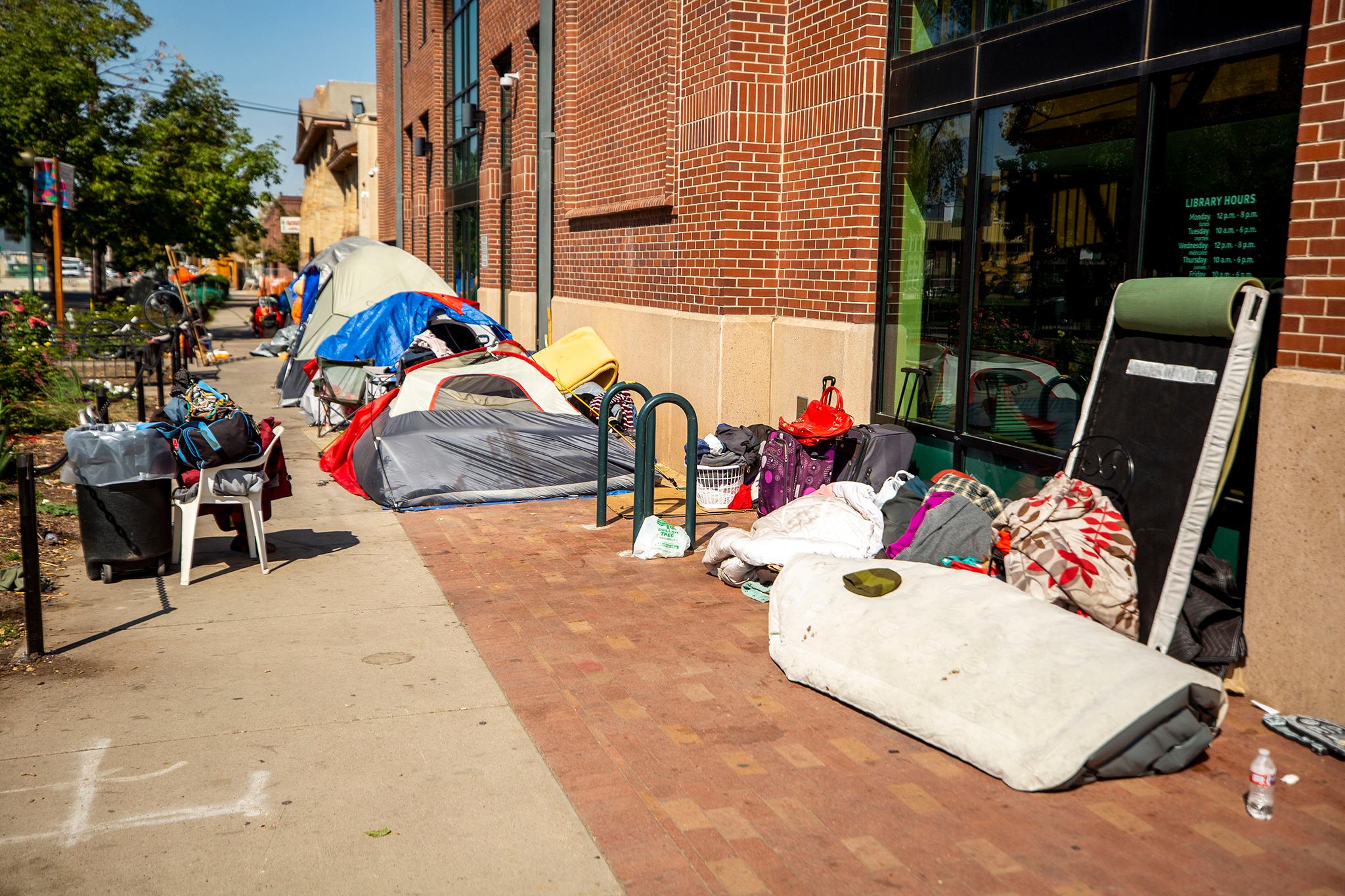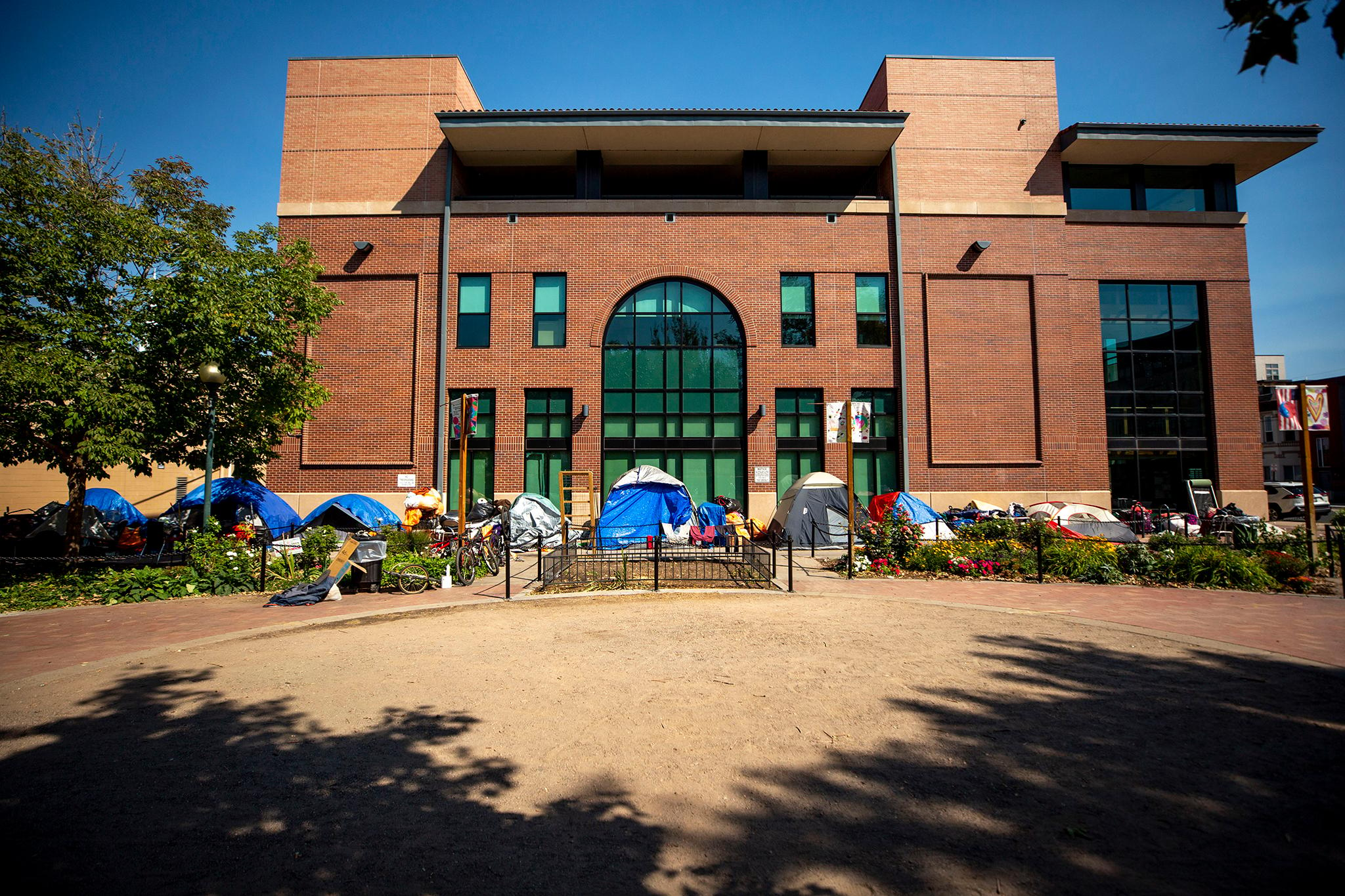Three months ago, Mayor Michael Hancock announced that, despite his longstanding opposition to letting people live on the streets, he had agreed that Denver should have a city-sanctioned, temporary camp -- a place where people experiencing homelessness could find shelter, bathrooms and connections to housing, health care and other services during the pandemic.
Since his June 24 reluctant embrace of sanctioned camping, more people have lost their homes because of the job-destroying impact of the coronavirus. Two locations have been publicly identified as possible sites for what also is known as a safe outdoor space, only to be withdrawn from consideration because of opposition in the community. In a Facebook post, Hancock announced the withdrawal of the second site, a plaza outside the Blair-Caldwell African American Research Library in Five Points, days before community forums on the proposal were to have begun. Hancock's post offered little explanation.
In an interview with Denverite this week, the mayor said it was because he thought his city needed more discussion to understand sanctioned camping.
"The reason why I felt it was important that we back away is that it was obvious that we have a lot of misunderstanding and misinformation not only externally to the city but within the city itself in terms of what this is and what this is not," Hancock said. "I just did not and do not feel comfortable until we all got on the same page. And that's why I called for a reset," adding that an education effort was needed.
But can a mayor who has repeatedly expressed misgivings about encampments of people experiencing homelessness lead on sanctioned camping? Hancock said he was committed to the idea as an emergency response during the pandemic.
"In this period of COVID we are certainly seeing more people who are unsheltered on our streets, and so it is calling for extraordinary measures," he said. "We're going to have to create a sanctioned site somewhere in order to begin the process of truly abating the number of unsanctioned sites on our streets."
Housing costs have for years increased faster than incomes have grown in Denver. According to a recent report from Hancock's housing department, rent increased by 62 percent between 2012 and 2018 and for-sale home prices by 73 between 2012 and 2018. Incomes rose by 35 percent over that period. Even before the pandemic, homelessness in Denver was growing, according to the annual Point in Time survey that provides a snap shot of the problem. When the last Point in Time was conducted, in January, 996 people were found living outside across the city. A survey of several central Denver neighborhoods by the advocacy organization Denver Homeless Out Loud in July, several months into the pandemic, found an estimated 1,328 people in 30 encampments. And according to the housing department, in the first seven months of 2020, the city's rental assistance program has helped more than 1,200 households, compared to 996 in all of 2019.
Hancock declined to say when the first sanctioned camp might open.
"We're not going to do anything haphazardly," he said. "I want to make sure we do it right, and not fast."

The Interfaith Alliance of Colorado has lobbied for sanctioned camping to address needs during the pandemic. Colorado Village Collaborative, a nonprofit founded by the Interfaith Alliance, has raised the funds and put together a staff to run the first sanctioned camp when it opens.
Kathleen Van Voorhis, the Interfaith Alliance's point person on housing and homelessness, said after the Blair-Caldwell proposal was withdrawn that she was committed to the education effort the mayor said was necessary. This week, the alliance and the collaborative were holding a webinar with presenters that included the manager of a sanctioned camp in Las Cruces, New Mexico, and offering public tours of a mock uninhabited camp set up outside a Denver church.
While Van Voorhis said she saw the need for discussion, she did not want a sense of urgency to be lost.
"We're facing a pandemic. If we were building an affordable housing project (in a normal period) we would have much more time to do a community engagement" process, she said. "I'm not sure we're all looking at this through the lens of a pandemic."
"It is vital for our community to understand that doing nothing is not an option," she said.
Van Voorhis described another barrier: resistance by people with homes to having people without homes in their neighborhoods.
"The hardest thing we're running into is truly people who don't want this in their backyard," she said. She said she hopes to "try to step away from, 'these homeless people don't want to work,' this 'us and them' mentality."
The mayor said that even after Denverites are able to learn more about sanctioned camping, he did not expect Blair-Caldwell to be reconsidered as a possible site. The other site that had been raised and then abandoned was the Denver Coliseum parking lot. Both sites are in City Council District 9, home to most of the city's shelters and other homelessness service sites. The area hosted two large shelters established during the pandemic, one inside the Coliseum and one inside the neighboring National Western Complex.
People living near the Coliseum have portrayed decisions to locate support for people experiencing homelessness in their impoverished, largely minority neighborhoods as part of a decades-old pattern of treating the area as a dumping ground for the city's problems. The Five Points Business Improvement District had said in reaction to the Blair-Caldwell proposal that Five Points was "already shouldering the majority of the homelessness and affordable housing crisis in Denver." It said it had plans to use the site to "further uplift this community, but will be unable to do so if it becomes a sanctioned camp."
"I think that there is a lot of concern in that area," Hancock said. "[It has been] absolutely inundated with the challenges around our neighbors who are experiencing homelessness."
Part of the argument for placing a sanctioned camp next to Blair-Caldwell is that people experiencing homelessness are already living on the sidewalks around the library.
Gerald Horner, an arts management consultant who is part of a group of Curtis Park homeowners who support the safe outdoor space proposal, said: "We're not trying to add to the camping that's already happening. We're talking about creating something that's safer, better."

Horner said that because a sanctioned camp would have bathrooms and regular trash collection, homeowners would no longer have to worry about the rats drawn by waste and the damage done by people urinating and defecating on the grass. People experiencing homelessness would have access to service providers who could help them one day leave the streets.
"Ultimately, housing needs to be built," Horner said. "But in the meantime, what about today? What about tomorrow?"
Horner spoke as he watched city workers in a parking lot behind Blair-Caldwell load tents and other belongings into a trash truck Wednesday morning. Denver's Department of Transportation & Infrastructure had targeted the lot and surrounding areas for one of the periodic clean ups it says are necessary to maintain safety and sanitation in the public right of way.
For six months, Maurice Brown had been living in the area targeted for Wednesday's cleanup. Before that, he'd spent months in shelters after moving from New Mexico to Colorado. He said he moved to the streets because of COVID-19.
"I just felt that if it hit the shelters, there'd be no way to avoid it," he said.
Brown said he wished he had researched Denver's housing prices before leaving New Mexico after a job as a corrections officer and counselor burned him out. He's been doing day labor and looking for other work since arriving in Denver.
Brown said he had heard of the possibility of a sanctioned camp at Blair-Caldwell, and then heard the idea had been abandoned. He said he could understand why businesses and homeowners would not want any camping, sanctioned or not.
"I don't want to infringe," Brown said. But "we have to be somewhere. It would be nice to be somewhere where we're actually allowed to be."













